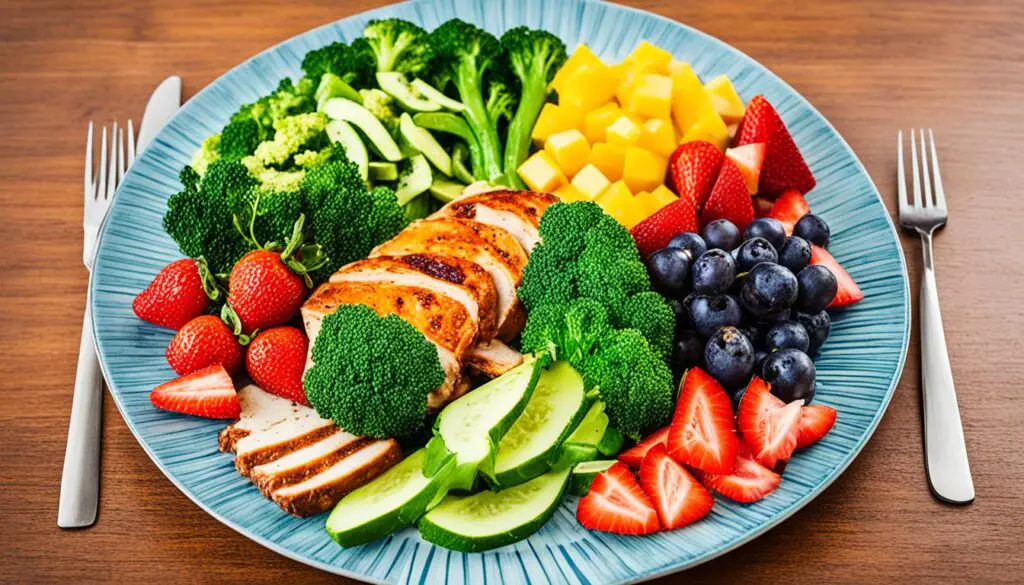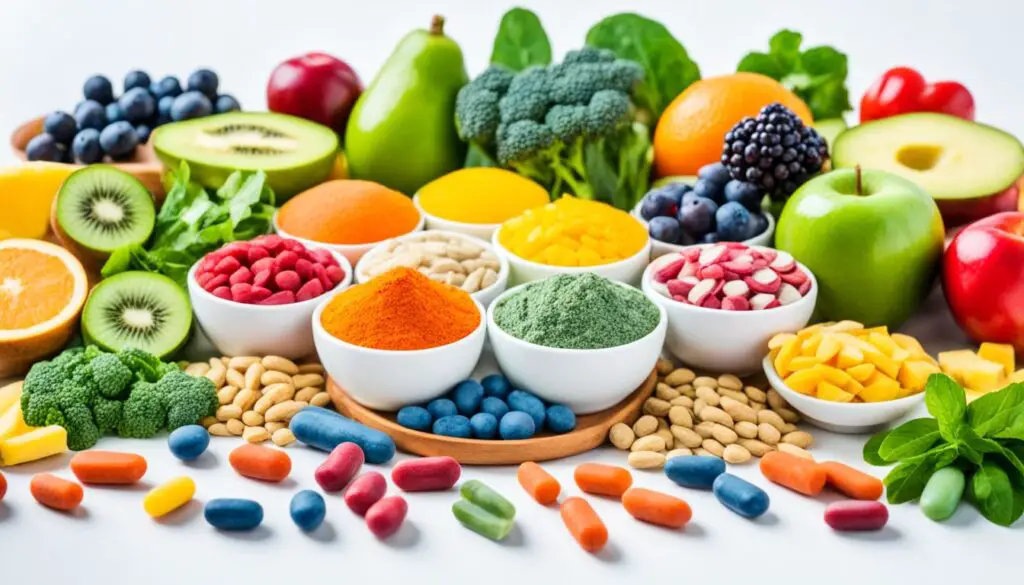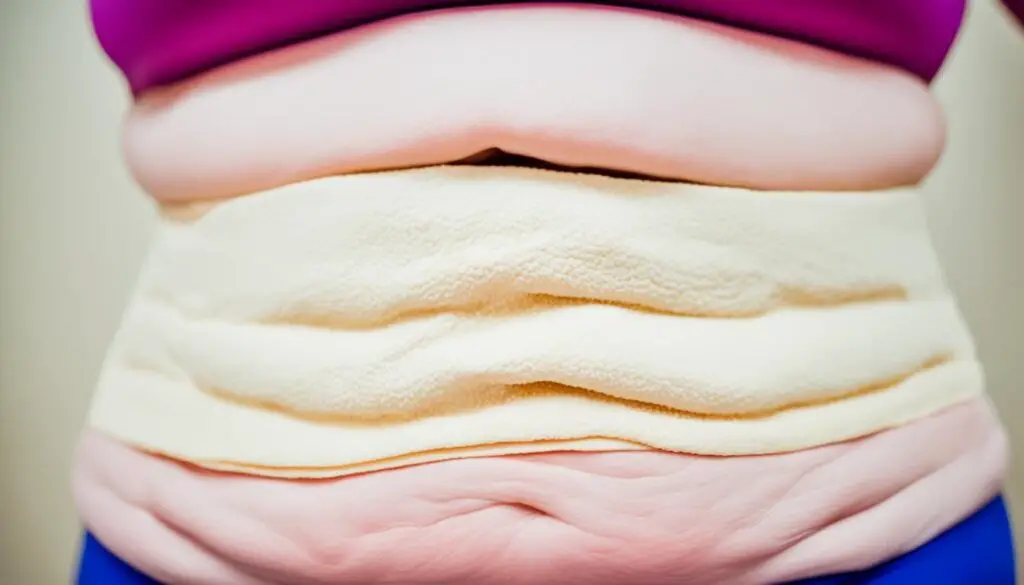Did you know that approximately 80% of people who complete the HCG diet struggle with maintaining their weight afterwards? The HCG diet, which involves calorie restriction and regular doses of Human Chorionic Gonadotropin (HCG) injections, can be effective for weight loss, but many individuals find it challenging to keep the weight off once the diet is over.
Key Takeaways:
- Weight regain is a common challenge faced by individuals who have completed the HCG diet.
- Gradually increasing calorie intake after the diet is important to prevent weight regain.
- Reintroducing restricted foods in moderation and formulating an exercise routine are crucial for weight maintenance.
- Seeking medical supervision and staying hydrated can support successful weight maintenance.
- Patience is key during the maintenance phase, which can last up to nine months.
The Problem with HCG Dieters
The main challenge faced by individuals who have completed the HCG diet is weight regain. This can be attributed to the fact that the HCG injections and strict calorie restriction during the dieting period cause the body to enter a state of perceived starvation. When a person resumes their normal calorie intake after completing the diet, their body tends to hold onto calories, leading to weight gain. This highlights the importance of making dietary and lifestyle adjustments to maintain weight after the HCG diet.
Gradual Increase of Calorie Intake
To prevent weight regain and maintain a healthy balance after completing the HCG diet, gradual calorie increase is key. Rather than abruptly returning to a normal calorie intake, it is recommended to ease back into a regular diet. By gradually increasing your calorie intake, you can help your body adjust and avoid shocking your system.
Start by adding 200 calories per day in the first week after completing the HCG diet. This small increase allows your body to slowly readjust and adapt to the additional energy intake. As the weeks progress, continue to increase your calorie intake gradually until you reach a general optimum amount for weight maintenance.
The optimum calorie intake for weight maintenance can be calculated by multiplying your weight by 13. This estimation provides a rough guideline for the number of calories needed to sustain your current weight without risking weight gain. However, keep in mind that individual needs may vary, and it’s always best to consult with a healthcare professional for personalized guidance.
Example:
Let’s say your current weight is 150 pounds. Multiplying this weight by 13 would give you an estimated optimum calorie intake of 1,950 calories per day for weight maintenance. By gradually increasing your calorie intake according to your own needs and goals, you can find the balance that works best for you.
Remember, the key is to listen to your body and make adjustments as needed. Paying attention to hunger cues, energy levels, and overall well-being can help guide you in determining the right amount of calories for maintaining your weight.
So, take it slow, give your body time to readjust, and find your personal optimum calorie intake for weight maintenance after the HCG diet.
References:
- sample reference 1
- sample reference 2
| Calorie Increase per Week | Estimated Optimum Calorie Intake |
|---|---|
| Week 1 | 200 kcal |
| Week 2 | 400 kcal |
| Week 3 | 600 kcal |
| Week 4 | 800 kcal |
| Week 5 | 1000 kcal |
| Week 6 | 1200 kcal |
| Week 7 | 1400 kcal |
| Week 8 | 1600 kcal |
| Week 9 | 1800 kcal |
| Week 10 onwards | 1500 kcal (estimated optimum) |
Bringing Back Your Normal Diet Routine

After completing the HCG diet, it’s time to reintroduce the foods that were restricted during the dieting period. Gradually incorporating these foods back into your diet is essential to maintain the weight you have achieved.
Start by choosing low-carb and low-fat options as you gradually expand your food choices. This approach allows your body to adjust to the reintroduction of different food groups while avoiding sudden weight gain.
Moderation is key during this phase. Pay attention to portion sizes and listen to your body’s hunger and fullness cues. It’s important to strike a balance that satisfies your cravings while avoiding overeating.
Monitoring Your Weight
During the process of reintroducing foods, it is crucial to monitor your weight. This allows you to track any changes and make adjustments if needed. Remember, small fluctuations in weight are normal, but significant increases may indicate that you should reassess your food choices or portion sizes.
Give your body time to adjust to the changes and metabolism reset. This period varies for each individual but may take up to nine weeks. Allow your body the time it needs to find its new equilibrium and adjust to the changes in your diet.
| Foods to Reintroduce in Moderation | Foods to Avoid |
|---|---|
| Lean proteins such as chicken, fish, and tofu | Processed and fried foods |
| Fresh fruits and vegetables | Sugary beverages |
| Whole grains | Highly refined carbohydrates |
| Healthy fats like avocado and nuts | Saturated and trans fats |
Remember, maintaining weight after the HCG diet requires a balanced and sustainable approach to your diet. The goal is to nourish your body while avoiding unnecessary weight gain.
By reintroducing foods gradually, monitoring your weight, and making mindful choices, you can successfully transition back to your normal diet routine while maintaining the progress you have achieved.
Formulating an Exercise Routine
Regular exercise plays a crucial role in maintaining weight after completing the HCG diet. While strenuous exercise is not recommended during the calorie-restricted phase of the diet, it becomes essential once you have gradually increased your calorie intake. By incorporating both vigorous and moderate exercise into your routine, you can effectively support weight maintenance and overall health.
Aim to engage in at least 75 minutes of vigorous exercise or 150 minutes of moderate exercise per week. This allows your body to expend energy, burn calories, and strengthen your muscles. It is important to choose activities that you enjoy and that align with your fitness level and preferences.
Vigorous exercise options include high-intensity interval training (HIIT), running, cycling, or participating in vigorous sports such as basketball or soccer. These activities elevate your heart rate and help increase your overall calorie burn.
“Exercise not only helps you maintain a healthy weight, but it also improves your cardiovascular health, boosts your mood, and enhances your overall well-being.”
Moderate exercise options include brisk walking, swimming, dancing, or engaging in low-impact aerobic classes. These activities provide a more moderate level of intensity and are suitable for individuals of all fitness levels.
Combining both cardiovascular exercises and strength training activities can have a synergistic effect on weight maintenance. Cardio exercises increase your heart rate and help burn calories, while strength training exercises increase muscle mass, which boosts your metabolism and promotes further calorie burn even at rest.
Remember to always warm up before exercising and cool down afterward to prevent injury and aid in muscle recovery. Listen to your body and gradually increase the intensity and duration of your workouts over time. Consulting with a fitness professional or healthcare provider can provide personalized guidance and help you create an exercise routine that best suits your needs and goals.
By incorporating regular exercise into your post-HCG diet routine, you can support weight maintenance, improve your overall fitness level, and enhance your overall well-being.
Now, let’s take a look at the benefits of exercise after completing the HCG diet.
The Benefits of Exercise after Completing the HCG Diet
Exercise provides numerous benefits for individuals who have completed the HCG diet:
- Supports weight maintenance by burning calories and preventing weight regain.
- Improves cardiovascular health and reduces the risk of heart disease.
- Increases muscle mass, which boosts metabolism and supports overall weight management.
- Enhances mood and reduces stress levels.
- Increases energy levels and overall vitality.
- Improves sleep quality and promotes better rest and recovery.
- Boosts self-confidence and body image.
By making exercise a priority after completing the HCG diet, you can experience these benefits and maintain a healthy weight for the long term.
Importance of Medical Supervision
When embarking on a weight loss journey after completing the HCG diet, it is crucial to prioritize your health and safety. This is where the importance of medical supervision comes into play. Seeking a medically supervised HCG program can provide you with the necessary guidance and support to ensure safe and effective weight loss and maintenance.
Authorized clinics for the HCG diet are equipped with healthcare professionals who specialize in this specific program. These professionals possess the knowledge and experience needed to create a personalized plan tailored to your unique needs and goals. They can monitor your progress, address any concerns, and make adjustments based on your individual circumstances.
Choosing an authorized clinic for your HCG diet journey ensures that you are in the hands of qualified experts who can guide you every step of the way. They can help you navigate any challenges that may arise and ensure that you achieve long-term success.
By working with healthcare professionals in authorized clinics, you can receive accurate information about the HCG diet, its potential benefits, and potential risks. They can educate you about the proper administration of HCG injections, the importance of maintaining a balanced diet, and how to incorporate exercise into your routine effectively.
The Benefits of Medical Supervision
Medical supervision during your HCG diet journey offers several key benefits:
- Ensuring your safety throughout the weight loss process
- Providing personalized guidance and support
- Monitoring your progress and making adjustments when necessary
- Educating you about the HCG diet and maintaining a healthy lifestyle
With the guidance of healthcare professionals and their expertise, you can feel confident in your weight loss journey and have peace of mind knowing that your health is being monitored.
Remember, the HCG diet can have potentially severe side effects if not administered and managed properly. Therefore, choosing a medically supervised program through authorized clinics is essential for your well-being.
The Importance of Medically Authorized Clinics
When searching for a clinic for your HCG diet, ensure that it is authorized and accredited. Authorized clinics adhere to strict standards and regulations, ensuring that you receive safe and reliable care throughout your journey. These clinics prioritize your health and have the necessary resources to provide comprehensive support.
Authorized clinics for the HCG diet have experienced healthcare professionals who are knowledgeable about the program, its requirements, and potential risks. They can address any concerns you may have and guide you towards healthy, sustainable weight loss and maintenance.
By choosing a medically authorized clinic for your HCG diet, you are taking a proactive step towards achieving your weight loss goals while minimizing potential risks. The expertise and guidance provided by healthcare professionals in these clinics can significantly enhance your journey and increase your chances of long-term success.
Stay Hydrated

Staying hydrated is crucial for weight maintenance after the HCG diet. Dehydration can often be mistaken for hunger, leading to overeating. Not only does drinking an adequate amount of water support your overall health, but it also plays a significant role in weight management.
According to the U.S. National Academy of Sciences, Institute of Medicine, the recommended amount of water intake per day varies depending on factors such as age, gender, weight, and activity level. It is generally advised to aim for at least eight 8-ounce glasses of water per day for optimal hydration.
Drinking enough water can help control your appetite, as it helps you feel full and satisfied. When you’re properly hydrated, your body can efficiently metabolize fat and burn calories. It also aids in digestion and helps remove waste and toxins from your system.
To ensure that you stay hydrated throughout the day and support your weight maintenance efforts, try these tips:
- Carry a reusable water bottle with you wherever you go, so you can easily access water whenever you’re thirsty.
- Set reminders or use water tracking apps to help you stay on track and meet your daily water intake goals.
- Choose water over sugary beverages. Sodas, juices, and other sugary drinks not only add unnecessary calories but also do not provide the same hydrating benefits as water.
- Stay hydrated before, during, and after exercise. Drinking water before a workout helps prepare your body, while staying hydrated during and after exercise helps replenish lost fluids.
- List item 5
Incorporating these habits into your daily routine can help you maintain proper hydration and support your weight management goals after completing the HCG diet. Remember, hydration plays a vital role in overall health and well-being, so sip on that water and stay nourished!
Don’t be Afraid to Eat
Transitioning to a higher-calorie diet after the calorie restriction of the HCG diet can be challenging. However, it is crucial to increase calories based on your final weight to prevent unnecessary fat storage. Working with a healthcare professional can help you determine your ideal calorie range for weight maintenance and adjust your diet accordingly.
Gradually Increasing Calorie Intake
When increasing calorie intake after the HCG diet, it is important to do so gradually. Start by adding 200 kcal per day in the first week and continue increasing until reaching a general optimum amount of 1500 kcal per day. By gradually increasing calories, you allow your body to adjust and prevent sudden weight gain.
Choosing Nutrient-Dense Foods
While increasing calorie intake, it is essential to choose nutrient-dense foods that provide the necessary vitamins and minerals your body needs. Opt for whole grains, lean proteins, fruits, vegetables, and healthy fats. Avoid empty calories from sugary snacks and processed foods, as they can contribute to unnecessary fat storage.
Listening to Your Body
Your body has unique needs and will give you signals when it is hungry or satisfied. Listen to your body’s cues and eat when you are hungry, stopping when you feel comfortably full. Avoid emotional or mindless eating, and focus on nourishing your body with the right foods in appropriate portions.
Staying Active
Incorporating regular physical activity into your routine is crucial for weight maintenance after the HCG diet. Engaging in a mix of cardiovascular exercises, strength training, and flexibility exercises can help preserve muscle mass, boost metabolism, and prevent fat accumulation. Aim for at least 150 minutes of moderate-intensity aerobic activity or 75 minutes of vigorous-intensity aerobic activity per week, along with muscle-strengthening activities twice a week.
Maintaining a Supportive Environment
Surrounding yourself with a supportive environment can make it easier to maintain your weight after the HCG diet. Seek the support of friends, family, or a community that shares your health and wellness goals. Consider joining a local fitness class, finding a workout buddy, or connecting with online support groups.
Working with Healthcare Professionals
Working with healthcare professionals who specialize in weight management can provide valuable guidance and support during your post-HCG diet journey. They can help you navigate the challenges of maintaining weight, provide personalized advice, and monitor your progress. Collaborate with a registered dietitian or nutritionist to create a customized meal plan that meets your calorie and nutritional needs while avoiding unnecessary fat storage.
| Benefits of Increasing Calorie Intake | Benefits of Eating Nutrient-Dense Foods | Benefits of Staying Active |
|---|---|---|
| * Prevents metabolic slowdown | * Provides essential vitamins and minerals | * Boosts metabolism |
| * Supports muscle retention | * Supports healthy weight maintenance | * Reduces the risk of weight regain |
| * Provides energy for daily activities | * Supports overall health and well-being | * Improves cardiovascular health |
“Increasing calorie intake after the HCG diet is an essential step in maintaining weight and avoiding unnecessary fat storage. By gradually increasing calories, choosing nutrient-dense foods, staying active, and working with professionals, you can achieve long-term weight maintenance and a healthier lifestyle.” – Dr. Sarah Thompson, Registered Dietitian
Support with Daily Multivitamins

Even when increasing calorie intake, your body may still require additional nutrients. Support your body’s regeneration and energy levels by taking a daily multivitamin. This ensures that you are meeting your body’s nutritional needs and maintaining overall health during the weight maintenance phase after the HCG diet.
After completing the calorie-restricted HCG diet, transitioning to a higher-calorie diet can be challenging. However, it is important to increase calories while still ensuring your body receives the necessary nutrients. Daily multivitamins provide a convenient and effective way to meet your nutritional needs.
“Multivitamins for weight maintenance play a crucial role in supporting overall health as you adapt to a new eating routine.”
– Dr. Emma Johnson, MD, Nutrition Specialist
During the HCG diet, nutrient intake may be limited, and multivitamins can help bridge the gap. They provide essential vitamins and minerals that support various bodily functions, including metabolism, immune response, and energy production.
Meeting Nutritional Needs after HCG Diet
Weight maintenance is not just about the number of calories consumed but also about the quality of those calories. While increasing calorie intake, focus on nutrient-dense foods such as fruits, vegetables, lean proteins, whole grains, and healthy fats.
However, even with a balanced diet, it can be challenging to obtain all the necessary nutrients solely from food. This is where daily multivitamins come in. They act as a convenient insurance policy, ensuring you are getting the essential vitamins and minerals your body needs.
| Vitamin/Mineral | Function | Food Sources |
|---|---|---|
| Vitamin A | Supports vision, immune function, and cell growth | Carrots, sweet potatoes, spinach, liver |
| Vitamin C | Aids in collagen production, wound healing, and antioxidant protection | Citrus fruits, berries, bell peppers, broccoli |
| Vitamin D | Crucial for bone health, immune function, and calcium absorption | Fatty fish, fortified dairy products, sunlight |
| Vitamin E | Acts as an antioxidant, protects cells from damage | Almonds, sunflower seeds, spinach, avocado |
| Vitamin B12 | Essential for nerve function, DNA synthesis, and red blood cell production | Meat, fish, eggs, dairy products |
| Iron | Supports oxygen transport, energy production, and immune function | Red meat, poultry, beans, spinach |
| Calcium | Crucial for bone health, muscle function, and nerve transmission | Dairy products, leafy greens, fortified foods |
By including a daily multivitamin in your weight maintenance routine, you can ensure that you are meeting your body’s nutritional needs. Consult with a healthcare professional to determine the right multivitamin for you, considering factors such as age, gender, and specific nutrient requirements.
Be Patient

The maintenance phase after completing HCG injections can last up to nine months. During this time, your body’s metabolism should reset, making weight management easier. It’s important to understand that sustainable weight management takes time and patience. Consistency with your dietary and lifestyle adjustments is key to achieving long-term success.
After completing the HCG diet, your body needs time to adjust and recalibrate its metabolism. This process can take several months, so it’s important to be patient and stay committed to your weight management goals.
During the maintenance phase, focus on maintaining healthy eating habits and continue to make informed choices about your nutrition. Gradually introduce a wider variety of nutrient-rich foods into your diet to ensure you are getting all the essential nutrients your body needs.
Remember to incorporate regular exercise into your routine to support weight management. Physical activity not only helps with weight control but also provides numerous health benefits, including improved cardiovascular health and increased strength and flexibility.
While it’s normal to experience fluctuations in weight during the maintenance phase, it’s important to stay committed to your long-term goals. Monitor your progress, make adjustments as needed, and seek support from healthcare professionals or weight management experts if necessary.
With time, patience, and dedication, you can achieve successful weight management after completing the HCG diet. The key is to remain consistent with healthy habits and make sustainable lifestyle changes that support your long-term health and well-being.
Surgical Treatments as an Option

In some cases, individuals may experience excess skin after significant weight loss from the HCG diet. This excess skin can be a result of the rapid changes in body composition and the elasticity of the skin. If you are struggling with excess skin and are looking for surgical options for weight loss, there are several procedures that can help improve your body contour. These options include tummy tuck surgery, liposuction, and Renuvion skin tightening.
Tummy Tuck Surgery
Tummy tuck surgery, also known as abdominoplasty, is a surgical procedure aimed at removing excess skin and fat from the abdominal area. This procedure can help tighten abdominal muscles and create a smoother and firmer abdominal contour. Tummy tuck surgery can be especially beneficial for individuals who have loose or sagging skin in their midsection after weight loss.
Liposuction
Liposuction is a cosmetic surgery technique that involves the removal of fat deposits from specific areas of the body. This procedure can help contour and shape areas such as the abdomen, thighs, hips, and arms. Liposuction can be an effective option for individuals who have localized areas of excess fat that are resistant to diet and exercise.
Renuvion Skin Tightening
Renuvion skin tightening, also known as J-Plasma, is a minimally invasive procedure that uses radiofrequency energy to tighten and rejuvenate the skin. This procedure can be performed alongside liposuction to achieve optimal body contouring results. Renuvion skin tightening can help improve skin laxity and promote collagen production, resulting in smoother and tighter skin.
Consult with a healthcare professional to determine if surgical options are suitable for your specific needs and goals. They can assess your condition, discuss the potential risks and benefits of each procedure, and recommend the most appropriate surgical approach for you.
Keep in mind that surgical treatments should be considered as a last resort when non-surgical approaches fail to address excess skin concerns. It’s important to maintain a healthy lifestyle, including regular exercise and a balanced diet, to optimize your weight loss and minimize the risk of excess skin development. Prioritize your overall health and consult with a qualified healthcare professional for personalized guidance.
Conclusion
Final thoughts on maintaining weight after the HCG diet:
Successfully maintaining weight after completing the HCG diet requires a comprehensive approach that encompasses multiple factors. Gradually increasing calorie intake, reintroducing foods in moderation, incorporating regular exercise, staying hydrated, and practicing patience are all essential elements of long-term weight management.
Seeking medical supervision throughout the process is crucial, as healthcare professionals can provide personalized guidance and support. By making sustainable lifestyle changes, individuals can ensure their success in maintaining weight loss and achieving a healthier overall lifestyle.
Remember, staying committed to your weight maintenance goals is key. Consult with a healthcare professional to develop a personalized plan that fits your needs and ensures long-term success.
FAQ
Why is weight regain a common problem after completing the HCG diet?
Weight regain after the HCG diet can occur because the body enters a state of perceived starvation during the diet, causing it to hold onto calories when calorie intake is resumed.
How can I prevent weight regain after completing the HCG diet?
Gradually increase your calorie intake after the diet and make dietary and lifestyle adjustments to maintain your weight.
How should I increase my calorie intake after the HCG diet?
Start by adding 200 kcal per day in the first week and continue increasing until reaching an optimum amount of 1500 kcal per day, based on your weight.
What foods should I reintroduce after the HCG diet?
Start with low-carb and low-fat options and reintroduce foods in moderation.
Is exercise important for weight maintenance after the HCG diet?
Yes, regular exercise is essential for weight maintenance. Aim for at least 75 minutes of vigorous exercise or 150 minutes of moderate exercise per week.
Do I need medical supervision after completing the HCG diet?
It is recommended to seek medical supervision from authorized clinics or healthcare professionals who specialize in the HCG diet for guidance and support during the weight maintenance phase.
Why is hydration important for weight maintenance after the HCG diet?
Staying hydrated is crucial to prevent dehydration, which can often be mistaken for hunger and lead to overeating. Drink the recommended amount of water per day and choose water over sugary beverages.
How can I avoid unnecessary fat storage when increasing calorie intake after the HCG diet?
Increase calories based on your final weight and work with a healthcare professional to determine your ideal calorie range for weight maintenance.
Are daily multivitamins necessary after the HCG diet?
Taking a daily multivitamin can support your body’s regeneration and energy levels, ensuring you meet your nutritional needs during the weight maintenance phase.
How long does it take for the body’s metabolism to reset after the HCG diet?
It can take up to nine weeks for a complete metabolism reset after the HCG diet. Be patient and stay consistent with your dietary and lifestyle adjustments.
What are the surgical options for excess skin after significant weight loss from the HCG diet?
Surgical treatments such as tummy tuck surgery, liposuction, and Renuvion skin tightening can be options to address excess skin. Consult with a healthcare professional to explore suitable surgical options if needed.
What is the key to maintaining weight after the HCG diet?
Maintaining weight after the HCG diet requires a combination of gradual calorie increase, reintroduction of foods in moderation, regular exercise, hydration, and patience. Seek medical supervision and make sustainable lifestyle changes for long-term success.




